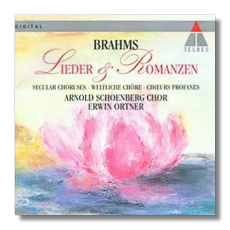
The Internet's Premier Classical Music Source
Related Links
- Brahms Reviews
- Latest Reviews
- More Reviews
-
By Composer
-
Collections
DVD & Blu-ray
Books
Concert Reviews
Articles/Interviews
Software
Audio
Search Amazon
Recommended Links
Site News
 CD Review
CD Review
Johannes Brahms

Secular Choral Works
- Lieder und Romanzen, Op. 93a
- Drei Gesänge, Op. 42
- Sieben Lieder, Op. 62
- Fünf Gesänge, Op. 104
- Vier Gesänge for Women's Chorus, 2 Horns & Harp, Op. 17
Arnold Schoenberg Choir/Erwin Ortner
Teldec 4509-92058-2
Brahms, throughout his career, wrote choral music, both sacred and secular. For me, he composed the greatest religious a cappella music since Bach. The secular works bring the Romantic choral song of Schubert, Schumann (in this area, as in others, Brahms' direct influence), and Mendelssohn to its height, not only intensifying the mood, but expanding the structure.
I suppose the best-known of these works are the two sets of Liebeslieder Waltzes, for singers and piano duet, but these are, in one sense, sports – all in triple time, all in the same AABB form. Nevertheless, the variety of mood and invention (including waltzes in canon!) astonish you, much as the Goldberg Variations do. On the other hand, the music on this disc responds to text in more straightforward and conventional ways. This does not mean the works themselves bore you, merely that they come off as less of a tour de force.
This disc presents whole works, unlike many other collections which gather bits and pieces. Someone may correct me, but I believe this is the first time opp. 17 and 104 have been recorded entire.
These works really test a choir: rich harmonies needing dead-on intonation and gorgeous tone; command of the full dynamic spectrum, especially the soft end; clear texture, to expose how the individual voices move. Very few of these numbers are fast or all that contrapuntally complex, but, paradoxically for those very reasons, they need precision of attack and rhythm. The relatively simple textures give singers no place to hide. In fact, most choirs break against the rhythmic requirements.
Seeing these works in one place emphasizes (perhaps more obvious to others) the echt-Romantic nature of the texts. So often they tell of the solitary in the woods, by the brook, in Spring and Autumn (the two most Romantic seasons), in the night. The three great choral nocturnes – "Waldesnacht" (Heyse), "Nachtwache I," and "Nachtwache II" (Rückert) – share a general mood of rapt contemplation, but with such variety. "Waldesnacht" is a great hymn to serenity, with a hint of the troubles that impel the speaker to find peace. In "Nachtwache I," tense chromatic harmonies, moving with almost symphonic power, convey the inexorable restlessness of desire, while a horn call sounds through "Nachtwache II" and leads to a gentle good night.
Choral aficionados will know most, if not all, of the works here. The real surprise is Op. 17, Four Songs, for the unusual combination of women's voices, two horns, and harp. Brahms wrote these while he held the post of conducting the Hamburg Women's Choir – a fact which shows a strongly practical approach to composition. A weak setting of Shakespeare's "Come away, come away, Death" disappoints, but the opening "Es tönt ein voller Harfenklang" and final "Gesang aus Fingal" call up the wild old bards, with ear-stretching harmonies on the harps (Brahms, as far as I know, never ventured beyond these limits or pressed as hard again) and, of course, the horns – Romanticism's call to arms.
Vienna's Arnold Schoenberg Choir has an enviable reputation in what we technically call the "ball-buster" choral repertoire, having turned in a fine performance of the Bach Mass in b. The intonation is superb, the rhythm good enough, despite some shaky spots. Nevertheless, the actual choral sound is, not surprisingly, German and thus "whiter" and lighter than American choruses. Ortner does very well indeed, but I really want to hear the yummy Robert Shaw sound in this repertoire.
I have never been able to fault Teldec sound. Technically, this is a superb disc. Highly recommended.
Copyright © 1997, Steve Schwartz



















